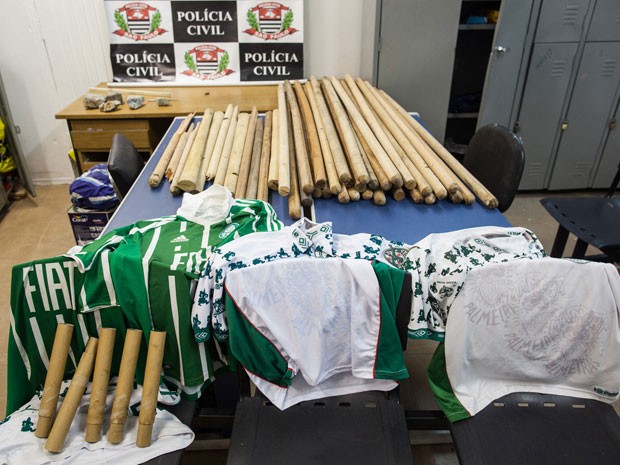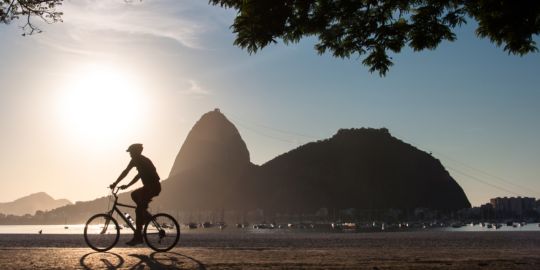Brazil has to act now to curb football violence and hooliganism IF they expect to host the World Cup in 2014 and not come out of it disgraced in front of the whole world.
Hooliganism and violence related to football (soccer to North Americans) is nothing new, it's been around for ages. What is vastly different here in Brazil is who the hooligans are and how the government deals (or in Brazil fails to deal) with the offenders. In the rest of the world the issue of sport violence is taken quite seriously and the various governments take swift and rigorous measures to try and eradicate it. Not here though.
Starting in the 60s the United Kingdom had a reputation worldwide for football hooliganism. So much so that the phenomenon was dubbed “The English Disease” in most places. The government, especially under Margaret Thatcher took a very hard line demanding severe penalties for the offenders, segregating rival fan groups by fencing off areas of the stadium, even calling for identification cards for organized fan groups. There was a dramatic decrease in the related violence following passage of the Football Spectators Act.
Greece went so far as to shut down all of the country's football stadiums for two weeks in 2007 to attempt to curb the violence there. Other European, Asian and African nations have cut short seasons, cancelled series tournaments, banned spectators and have taken other strong measures to wipe out hooliganism in their countries. Measures that, thus far, have not been adopted by any of the South American countries where it runs rampant.
The following is a direct quote from Wikipedia the online encyclopedia and accurately describes the situation here.
“Fans in Brazil join in organized groups often considered criminal organizations that differ in many aspects from European hooligans. They act as the main supporters of each club and often sell products and even tickets. They have numerous members and are often involved in criminal activities other than fights such as drug dealing and threats to players. These fans establish alliances with other "torcidas organizadas" as they are called such as the alliance between Força Jovem Vasco (CR Vasco da Gama), Galoucura (Clube Atlético Mineiro) and Mancha Verde (SE Palmeiras), the alliance between Torcida Indepdendente (São Paulo F.C), Torcida Jovem (C.R Flamengo) and Máfia Azul (Cruzeiro Esporte Clube) and some others alliances. They often schedule fights against rival groups where many are injured and killed. Sometimes different groups of hooligans from the same team clash. The Mancha Verde (meaning "Green Stain") is one of the most violent football fan clubs in Brazil. Its structure is very similar to a hooligan gang. As well, fans of local rivals TJP - Torcida Jovem Ponte Preta and TFI -Torcida Furia Independente clashed and rioted at a match in Campinas in 2002.”
The Brazilian government seems completely disinterested in dealing with this violence in any way and the various police forces are not only unprepared but lack the will and resources to do anything about it as well. Having come from Canada where soccer is relatively a little know and not extremely a popular sport like hockey, baseball and American style football, I find it extremely difficult to understand how people can become so completely wrapped up in any sport as to commit acts of violence and kill one another. Wake up Brasilia!!! The violence related to football in the rest of the world is on the decline and you as legislators are letting it run wild here. Get off your butts and do something about it now, once the World Cup is here in Brazil will be too late. You can't host a world class event with small-town minds and Stone Age attitudes toward dealing with the offenders.
While Congress wastes its time debating on whether or not alcoholic beverages should be sold in the stadiums and passage of the World Cup Act they turn a blind eye to the more serious problem of violence that the sale of alcohol at the events will only exacerbate.
The Time to Curb Football Violence and Hooliganism has come....

This photo is just some of the weapons seized by police in the ambush style attack on a bus load of Santos football fans that took place on the Anchieta Highway on Sunday, Oct. 19. The attack left dozens injured and one 21 year old man dead. He was purposely run down by an automobile driven by one of the opposing fans.
THIS IS NOT SPORT, it is not even sportsmanship... Brazilians wouldn't know sportsmanship if they fell over it. This is CRIMINALITY pure and simple.
It is high time that the Brazilian government step in and take drastic measures in order to curb the violence once and for all.
What can they do? Well, here are just a few suggestions:
1. Close all soccer matches completely. Let the teams play to empty stands as they have done in other countries. Televise matches, but establish a law that prohibits exhibiting the televised games in any public place such as bars, clubs, restaurants in order to prevent gatherings. Let these morons (and make no mistake about it, that's exactly what they are) watch the game at home on their TV. See how they like that!
2. Ban "torcidas organizadas" completely, they're nothing but criminal organizations in the first place and a thinly veiled front for numerous criminal activities. Create a law that makes membership in any so-called "fan club" a crime and vigorously prosecute offenders.
3. Ban any public gatherings around or near football stadiums for 12 hours before and 12 hours following any football match, especially any in which participants wear any team related articles of clothing or display such material.
4. Ban the sale of alcoholic beverages in, around and near stadiums for 12 hours before and 12 hours following football matches, close establishments that don't comply and arrest "found-ins".
5. Aside from any other criminal charges that may result from football related violence, individuals who are arrested should be charged with "Criminal Association" or with "Formação de quadrilha" if they can be proven to be members of any organized fan clubs.
6. If all of the above do not produce the desired effect then simply ban all professional football matches, period - "Fim de papo"!!! Maybe then this pack of animals will learn something.









